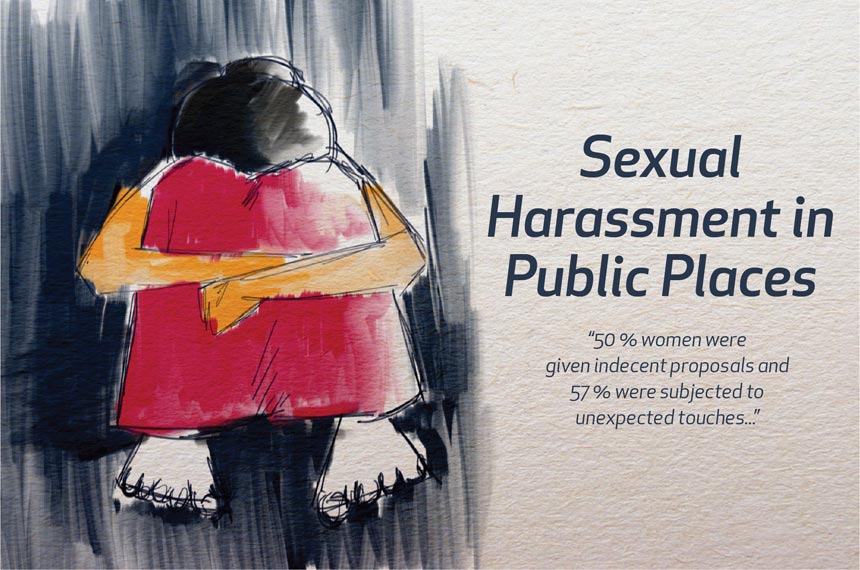
Table of Contents
Introduction
According to a 2022 UN survey, women, constituting approximately 3.95 billion of the global population continue to face significant challenges compared to men. To bridge this gap, women must gain independence through education, employment, and empowering others. However, achieving this independence is often hindered by discrimination and harassment in educational and professional settings.
Discrimination in education can obstruct a woman’s path to success from the outset. If a woman is denied opportunities to learn and grow, her chances of securing employment diminish. Even when women do enter the workforce, they frequently face the threat of discrimination, harassment, and sexual violence, which undermines their confidence and productivity.
Such barriers not only impede individual growth but also stifle broader societal progress. The Sexual Harassment of Women at Workplace Act was established to address these critical issues. This legislation underscores the necessity of protecting women’s rights to ensure their ability to work safely and without fear.
A nation’s development is significantly measured by how it treats its women. When a substantial portion of the population is hindered by discrimination and harassment, it reflects poorly on the country’s overall progress. Ensuring women can pursue their professions without fear is a matter of individual rights and a crucial component of national development. Protecting women’s rights in the workplace is essential for fostering an inclusive and prosperous society.
Public Place vs. Work Place
Public Place

Public sexual harassment is a type of GBV in the public domain that entails receiving unwanted and annoying sexual advances and intimidating physical behavior. This harassment occurs both physically and virtually, affecting mainly girls, women, and minorities within society. However, it is crucial to understand that anyone is capable of experiencing PSH.
Such an attitude not only violates the physical and personal integrity of a person but also contributes to maintaining unequal relations and fear. Preventing and responding to PSH involves engaging society, bolstering legal protection, and providing resources to survivors and their families. Education and public participation are critical strategies in transforming people’s views on social norms and ensuring that everyone is safe in public places.
It is crucial to recognize that people with PSH can have diverse experiences based on their age, gender, race, ethnicity, socioeconomic status, and other factors to advance effective prevention and treatment strategies. It is crucial to fight and eliminate PSH and establish a society that is free from such deviant behavior throughout the community.
Work Place

Sexual harassment in the workplace implies sexual conduct creating an unwelcome atmosphere and interfering with the workplace. It can include verbal communication in the form of sexual harassment comments, jokes, and propositions for sexual relations, nonverbal communication in the form of staring or showing sexually provocative materials, and sending messages with sexually provocative connotations. Physical harassment means touch or strike, and quid pro quo harassment involves offering employment preference in exchange for sexual favors.
When a person is subjected to abuse and ridicule in the workplace in a systematic manner that is persistent it has serious consequences on the worker’s productivity and even their health. This hostile environment erodes the professional tone of working relationships, ultimately resulting in reduced work satisfaction, performance, and health challenges among staff.
To effectively prevent and handle incidents of workplace sexual harassment the following actions should be taken. The programs have to have clear anti-harassment policies, regularly deliver awareness training sessions so that workers can be aware of possible harassment, and create effective reporting systems. The #MeToo movement indicates the importance of creating a supportive environment that will not punish those who come forward with cases of abuse.
It could be argued that by preventing instances of sexual harassment from occurring in the first place and making the workplace a hostile environment for such behavior, workplaces would be made a safer, fairer, and more equal place for employees.
Laws for Sexual Harassment
POSH Act,2013 (Sexual Harassment at the workplace)
The Sexual Harassment of Women at Workplace (Prevention, Prohibition and Redressal) Act, 2013 also known as the POSH Act is legislation meant to protect women against sexual harassment in India. Introduced due to increased awareness of workplace harassment, the POSH Act’s goal is to prevent women from being harassed at workplaces.
The Act provides for constitution of Internal Complaints Committee (ICC) in all those establishments having ten or more employees. This means that the ICC is charged with the task of receiving complaints; investigating those complaints; and handling complaints of sexual harassment. It has to comprise of a chief officer who is a senior woman employee, two other employees and an outsider is required to be an active member of an NGO/association working for women.
According to the POSH Act, sexual harassment means unwelcome physical or verbal conduct such as touching, inviting, or requesting sexual favors from another person, making comments of a sexual nature, and any other unwelcome conduct of a sexual nature whether physical or verbal. It also defines when one can be considered to have harassed the other, for example, when one threatens to give the other a promotion or demote him/her or even when one makes the working environment unbearable for the other.
The best part about POSH Act is that it focuses a lot on prevention too. Employers are mandated to facilitate awareness training at least once a year, orientate the ICC members once a year, and ensure visibility of the penal provisions of sexual harassment. They also need to develop another set of guidelines to address organizational response to cases of sexual harassment.
The Act also outlines the time frame within which complaints have to be addressed and considering the fact that the process has to be done within 90 days. They underline the confidentiality of the procedure and prohibit any retribution against the ones who file complaints, so that women can file complaints without consequences.
The POSH Act of 2013 is an important advancement toward gender sensitivity, creating workplace environments that are free from harassment.
Landmark Judgement
Vishaka and others vs. State of Rajasthan (Bhanwari Devi Case)
The Vishaka and Others v. State of Rajasthan, also referred to as the Bhanwari Devi case, is a judgment made by the Supreme Court of India in the year 1997 which has laid down the basic guidelines to prevent sexual harassment in workplaces. This case originated in 1992 when Bhanwari Devi, a social activist, was gang raped while trying to protest a child marriage in Rajasthan. The Vishaka Association together with other women’s rights organizations filed the case.
The Supreme Court has ruled that sexual harassment in the workplace is an unlawful infringement of women’s rights under the Constitution of India and international treaties. It focused more on the role of the state in eradicating such harassment and the available legal measures for those who experience it. The Court gave detailed directions for the elimination of sexual harassment in the workplace. These guidelines required the formation of complaint committees at district and state levels, a code of conduct for employers, and training of employees on sexual harassment matters.
The Bhanwari Devi case was instrumental in raising the women’s legal position by defining sexual harassment as gender violence and providing for legal measures to prevent and punish such practices. They resulted in the formulation of the Sexual Harassment of Women at Workplace (Prevention, Prohibition, and Redressal) Act, 2013, known as the POSH Act crystallized these guidelines into legislation.
This judgment has continued to be a reference point in the fight against sexual harassment and gender violence not only in India but across the world. This case shows how crucial it is to have a safe work environment where women can report gender-related abuses and injustices against them.
State of Maharashtra vs. Madhukar Narayan Mardikar, AIR 1991 SC 207
The State of Maharashtra v. Madhukar Narayan Mardikar also known as the Mardikar case is one of the landmark judgments delivered by the apex court of India in the year 1991 where the supreme court upheld the responsibility of the police officers to safeguard the rights of the persons in their custody. This case arose as a result of a serious allegation that Manorama was raped by Madhukar Narayan Mardikar – a police inspector while in police custody.
First and foremost, the trial court convicted Mardikar of rape and other charges and ordered him to serve a life term. This was affirmed in the High Court when the appellant appealed the case. He then appealed to the Supreme Court which affirmed his conviction and the sentence passed on him. The Supreme Court noted that evidence pointed to the guilt of Mardikar in raping Manorama while she was in police custody. The Court underscored that it made the crime even worse to have happened inside a police station because it eroded public confidence in the police.
The Mardikar case is a landmark to the legal system in India as it sought to explain how police officers have a constitutional responsibility to safeguard the rights of any individual who is under their guard and hold full responsibility for any infringement of their rights. This is a landmark ruling in the fight against sexual violence, and it tackles abuses of power in the police service. It highlights the willingness of the judiciary to promote justice and protect citizens especially when they are in a vulnerable position from misconduct of those tasked with the responsibility of protecting the public.
Medha Kotwal Lele & Ors. Vs. Union of India & Ors.
Medha Kotwal Lele & Ors. Judgment in: W.P. No. 400/2005 & connected matters v. Union of India & Ors. judicial decision that was made by the Supreme Court of India in 2018 which dealt with the constitutional validity of the Sexual Harassment of Women at Workplace (Prevention, Prohibition, and Redressal) Act, 2013, informally known as the PoSH Act. This case originated from an application to the Bombay High Court by activists of women’s rights including Medha Kotwal Lele who advanced the argument that the PoSH Act was inadequate in protecting women from sexual harassment at the workplace and lacked adequate remedies for the victims.
The petitioners argued that the Act was silent on how third parties participate in the perpetration of harassment and failed to address online harassment and mandatory gender-sensitive training for members of the internal complaints committee. But, the Supreme Court did not pay heed to these arguments and maintained that the PoSH Act is a constitutional measure. The Court also stated that the Act offers substantial protection to women against sexual harassment at the workplace and is fully compliant with India’s CEDAW commitments.
This decision is important because it reminds people the importance of the PoSH Act in protecting women against SH at the workplace. It highlights that all the necessities of the Act have been appropriately fulfilled to provide legal protection and remedies to the victim. Also, the Court’s decision stressed the crucial aspect of correct enforcement and recognition of the existence of the Act, which, in turn, strengthens its application in practice.
The Medha Kotwal Lele case also serves as a special reference to address and fight sexual harassment and inequality for women at the workplace to be able to work in securely and with dignity.
Tuka Ram and Anr. Vs. State of Maharashtra, AIR 1979 SC 185
The Tuka Ram and Anr v. State of Maharashtra commonly referred to as the Mathura case is a case that was heard and determined by Supreme Court of India in 1979, originating from a 1972 alleged rape of a young woman Mathura by two police officers in a police station in Maharashtra.
After the occurrence, Mathura’s family reported the case, and the police officers were arraigned for rape and other charges. The trial court, however, acquitted the officers, and, rather infamously, they claimed that Mathura had given her consent to engage in sexual intercourse. The family took the matter to the High Court and even this court affirmed the acquittal.
The case was then taken to the Supreme Court where they ruled in favor of Mathura and directed that the police officers be retried. The Supreme Court observed that there was ample evidence to suggest that Mathura did not consent to sexual intercourse and, therefore, the judgment of the trial court was flawed. This ruling further affirmed that consent to sexual intercourse has to be expressly and voluntarily given, and absent of physical struggle, cannot be inferred.
The Mathura case is important for shaping some basic principles of law concerning consent and sexual assault. It stressed the necessity of obtaining clear and valid consent and also shifted the paradigm in the legal system regarding rape victims. It led to social activism and a change in laws such as the Indian Penal Code and the formulation of rules as to the handling of sexual assault cases.
The Mathura case still holds relevance in the current legal battles against sexual violence and discrimination against women in India in defining the principles of consent and justice for survivors of rape.
Conclusion
The eradication of sexual and workplace harassment plays a vital role in promoting gender equity and respecting the rights of women and other vulnerable groups. Some of these include the Vishaka case, the Mardikar case, and the Mathura case all of which have played critical roles in the development of the laws of India regulating sexual harassment and gender-based violence. These cases demonstrate the judiciary’s desire to protect women’s rights and have resulted in many changes in the legal system.
POSH Act of 2013 is a progressive step towards making work environments safer for women since it calls for preventive measures, defines harassment, and offers a legal framework for recourse. In the same manner, PSH demands effective societal and legal measures to protect women and minorities from harassment in the public domain.
Legal safeguards and legendary cases show that the fight against harassment is still relevant today. It re-emphasizes that consent cannot be implicit and must be given willingly; institutions such as the police and workplaces must be made responsible for protecting individuals’ rights.
Therefore, it is crucial to build upon these legal frameworks and anchors, increase awareness, and ensure better implementation of anti-harassment measures to safeguard and promote an inclusive progressive society. Promoting the rights of women is not only a noble cause but also a necessity in the overall development of any given nation. When we deny people their rights through harassment, we are denying them the chance at a better future.
Read also this : How to get a first law internship
BY: Aman Bijoriya (4th year B.A.LL.B)